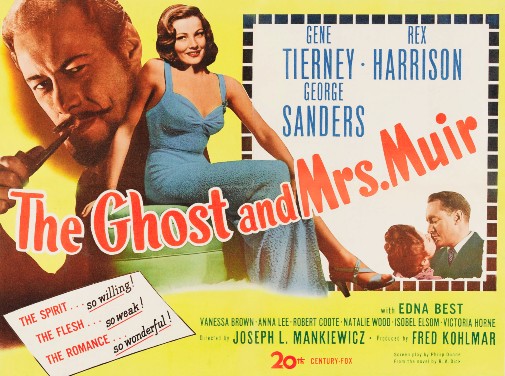
In fiction, love is more powerful and heartfelt when it's impossible. Be it the doomed lovers in Shakespeare's tragedies or Keira Knightley and James McAvoy separated by war and a child's lies in Atonement, we, as spectators, are predisposed to find beauty in the loves that cannot be. Death is a common way to enshrine romance in the perfection of upended passion. Like flowers plucked and dried, kept in the pages of a book, the love that's cut short by the Grim Reaper's blade can preserve its appearance. If it weren't for that, such amorous glories would do like their floral brethren, rotting away with time until dropping into the earth, a mushy decaying mess.
In 1947's The Ghost and Mrs. Muir, starring Rex Harrison and Gene Tierney, this dynamic between love and premature demise is both perpetuated and upended. Death facilitates and limits passion, making it harder to consummate but also more eternal than mundane existence. In Joseph L. Mankiewicz's movie, the transience of life is no obstacle for romance, quite the contrary…
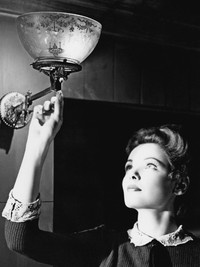 All this fatalistic talk reminds us that these themes have always danced, hand in hand, throughout Gene Tierney's filmography. Thinking of her most famous roles, we have Laura, a living woman made into a spectral ideal, shaped not by reality but by the self-absorbed affections of men. The performance that earned the actress her only Oscar nomination, in Leave Her to Heaven, saw Tierney play a more proactive role in the interlacing of love and death. She's a killer there, a sociopath, one who brings doom upon her husband's life, their romance a sweet cocktail laced with arsenic.
All this fatalistic talk reminds us that these themes have always danced, hand in hand, throughout Gene Tierney's filmography. Thinking of her most famous roles, we have Laura, a living woman made into a spectral ideal, shaped not by reality but by the self-absorbed affections of men. The performance that earned the actress her only Oscar nomination, in Leave Her to Heaven, saw Tierney play a more proactive role in the interlacing of love and death. She's a killer there, a sociopath, one who brings doom upon her husband's life, their romance a sweet cocktail laced with arsenic.
In Laura, Tierney was a ghost, in Leave Her to Heaven, she made ghosts through homicidal madness. In The Ghost and Mrs. Muir, she falls in love with one.
Unlike what that dumbfounding poster might have you believe, this whimsical fantasy is set in 1900, the dawn of the 20th century, when a young widow decides to move out of her relatives' house and get her own home with the meager wealth she has. To the horror of her real-estate agent, the titular Mrs. Muir decides to rent a seaside house by the name of Gull Cottage. Despite its cheap cost and generous size, the abode isn't particularly welcome to the new inhabitants. You see, the house is haunted by its previous owner, the cantankerous Captain Gregg whose embittered anger makes the place shake with ominous dread, the dead man's cackle echoing through its rooms.
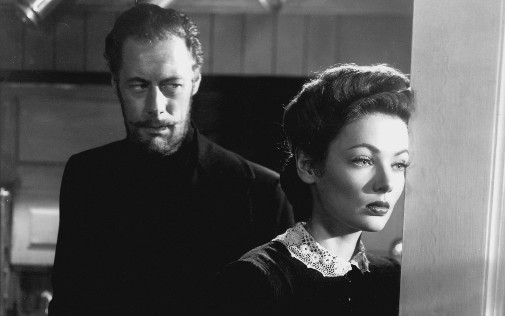
You'd expect Lucy Muir to choose the house despite its haunting, driven by economic despair and a sense of frugality. However, instead of being terrified or even put-off by the ghostly activity, she's almost delighted by it. At first, it appears she's an obstinate skeptic but, after a while, we understand Mrs. Muir is excited by the prospect of sharing her life with the undead. Despite a tinkling, mildly unconvincing, British accent, Gene Tierney brings fascinating energy to her character. Lucy's cheery in the face of despondence, her optimism spiked by stubbornness and her supernatural affiliations brought upon by a genuine sense of adventure, curiosity, and even a bit of sensualist excitement.
If nothing else, Tierney deserves applause for making Rex Harrison into a lover worthy of adoration, a charming Byronic hero whose fate earns our copious tears.
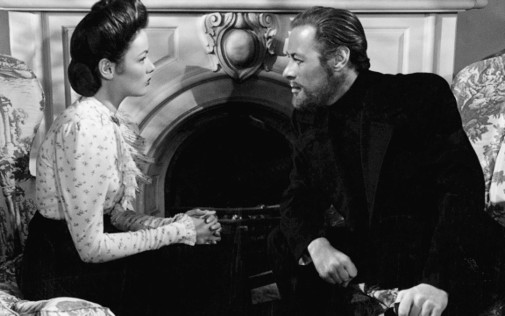
I must confess I wasn't expecting Lucy to be so idiosyncratic when first watching The Ghost and Mrs. Muir. At every turn, the actress and character make choices that surprise and startle, unnerving those who might anticipate dolorous passions or the indifferent wallowing of a damsel in distress. Because of such personable oddities, it's not shocking to see Lucy become accustomed to sharing space with Captain Gregg. Their first face to face interactions drip with pragmatism rather than terror, their budding relationship a kooky union between two headstrong people who recognize a good bit of themselves in the other individual. Primarily, they recognize their lonesomeness, their knowledge of loss.
As the narrative unfolds, tolerance grows into a friendship that grows into professional collaboration before blooming into love. Romance doesn't come instantly to these characters. Instead, it's worked on like a laborious effort that requires equal parts and patience and commitment. Things aren't easy, money is scarce, Natalie Wood's adorable (when is she not?), George Sanders is a mellifluous sleaze (when is he not?), the sea beckons the imagination, and the past builds the road to the future. The material, while high-concept, is treated with sincerity, its earnest feeling drawing humor from the plot without laughing at it, sketching eroticism between characters that can't touch.
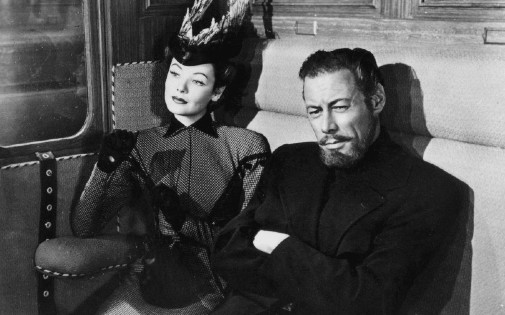
Charles Lang was nominated for an Oscar for the picture's silvery cinematography, the love child between glowing romance and the stark shadows of supernatural tales. The images are suffused with the briny air of the coastline, thick fog doing the part of soft focus, but they transmit warmth, comfort even. The same can be said about the luxurious score by Bernard Herrmann, a collection of melodies that haunt with their sheer beauty. Crafted with exquisite technique, inspiringly performed and charmingly plotted, The Ghost and Mrs. Muir enchants the viewer with a bittersweet spell. From its comedic salvos up to the glorious conclusion, it offers a meditation on pain overcome, regret, lost chances, and the dazzling luminosity of movie stars.
I laughed, I cried, I fell in love with Tierney's lovely Lucia, Harrison's ghostly seaman, and their transcendent affection for one another.
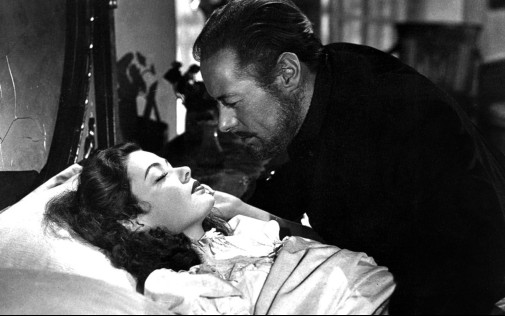
Previously:
- Laura (1944)
- Leave Her to Heaven (1945)